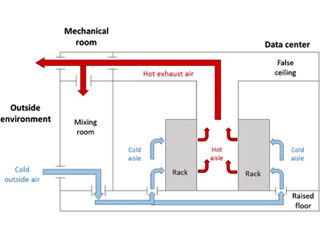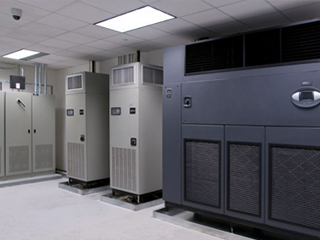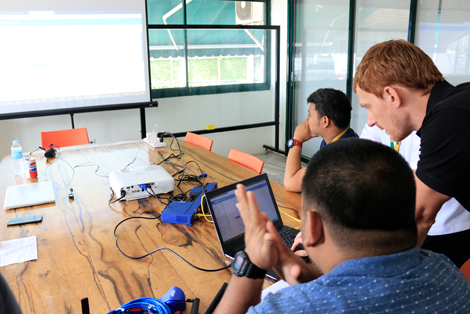Modular data center is one of the solutions made due to the surge of data production. As businesses are now challenged to establish new and more efficient data centers.
Cloud service providers, co-locators, and corporations face problems in redesigning their data centers. Nowadays, there are also other issues that affect building data centers.
In the US, the workforce is experiencing a shortage of skilled workers. This is due to the aging population in the country with insufficient new young blood taking their place. This shortage is likely to persist in the future.
Regulatory requirements in building data centers are important. But most data centers have a hard time adhering to environmental standards. Energy consumption is a major issue. Aside from this, the building costs and real estate prices are also increasing. As the demand for data centers increases, so are the costs and time needed to build one.
But worry no more. A modular data center presents efficient solutions for your problems. Modular power construction has become a popular construction method for data center upscaling. It allows businesses to opt for better and more efficient strategies. As well as keeping with the demands of the industry growth.
Traditional Data Center VS. Modular Data Center
Traditional data centers tend to be less efficient. The modular data center is a modern solution that helps address some of the issues in the data center industry. The following presents the differences between modular and permanent data centers. See how each can provide your data center needs.
-
Quality Control. Building a warehouse data center can be taxing. Businesses may experience difficulty dealing with construction crews, inspection teams, and installation teams. They may also experience problems with the software and hardware infrastructure. Meanwhile, a modular data center is built to measurable specifications. With construction and inspection from a single team. Modular data centers are manufactured to meet quality results. It is also easier to assemble and more convenient to have.
-
Scalability. Large data centers offer more space. But they are costly and require more time to finish. On the other hand, a modular data center is smaller and with limited space. But it comes intact and ready to use. It allows businesses to scale up or down and with less cost.
-
Keeping Up with the Latest Technology. The conventional data center needs a long time of planning before building to save capital costs. This leads private data centers to fall behind on technology trends. A modular data center has a shorter time frame for construction and deployment. Businesses are more up to date with the latest technology trend. They can also have the best technology at the time.
-
Resource Allocation. The conventional data center is more expensive because it requires paying for large cooling and power requirements. In a co-location enterprise, the costs in the data center are divided among customers. But it is still expensive due to the many consumptions of temperature and power needs. Even in the areas that are not in use but consume resources. While modular data centers provide more flexibility in allocating resources. Here, customers need to pay only for the space they occupy.
Understanding Modular Data Center
A modular data center is a design that uses contained units. Typically, in the form of prefabricated modules or infrastructures.
The modular market started with a standard approach. In the shape of an International Standards Organization (ISO) shipping container. Then it evolved to a fledgling market of vendors that produce everything. From containers to a variety of modular designed products. As well as solutions for IT, power, and cooling.
Below are the two forms of modular design in data centers.
It involves a customized infrastructure to support power or cooling design. As well as the racks of IT equipment. It is built using an ISO intermodal shipping container.
It involves a prefabricated module or a deployment method. It delivers data center infrastructure in a modular and more efficient method.
Take note that containment design is different from modular design. The container data center is a package, built and delivered in a particular way. That is, in an ISO shipping container. The modular data center is a deployment method built for assembling a data center from modular components. This is usually in prefabricated solutions which allow for scalability and quick delivery.
Moreover, a container is different from a modular one. But a container can be part of a modular data center.
Modular Data Center Designs
Modular data centers are portable solutions for deploying data processing capacity wherever it is required. They carry enormous amounts of power within a small footprint and a strict timescale.
The modular power units are engineered and examined in a controlled environment. This is to ensure that the units follow the project specification. Then, they are shipped to the site of the data center. From here, they are built, tested, and installed.
Modular data centers provide many benefits. Customers can fully customize these infrastructures. They may choose to have infrastructures in enclosed switch rooms. Or perhaps in an open-frame power skid. Modular data centers have three major types. These types are explained further below.
As mentioned earlier, a container is built in a conventional shipping container. It is typically built outdoors on a foundation. Customers may choose between two sizes, 40 x 8 ft and 20 x 8 ft. A container also has a standard height. It can be customized for the addition of chillers outside the facility. As well as for installation of power supply or for a door opening. A container is generally limited to 200 to 250 kW for an IT rack. While it can be limited to 500 kW for cooling and power. The size of a container can only hold a limited number of racks. Customers should look for ways to maximize rack space.
This system is built on a metal platform. It can be integrated with other skid equipment and electrical systems. It is easy to move and assemble in an area. It is also engineered and tested in a factory to ensure quality and easy installment. A skid-mounted system has no standard size. Hence, it can be flexible for expanding. It can be assembled in a shorter amount of time. It is also cheaper and more versatile than custom-built enclosures.
This can be a self-contained shell or metal housing. The enclosure comes in different sizes. It comes as pre-configured components with several modules on site. It helps save money and time for construction. It is also designed to fit in an existing structure. Such as next to a building or in a parking lot. An enclosure can also be built outdoors. It protects systems from harsh weather and severe environments.
A modular data center enclosure has two types.
This enclosure has data center gear that includes networking, servers, and storage. It can house biometric locks and dry-type fire suppression. As well as other forms of protection. This type of enclosure has its own cooling and power systems. It is also completely and fully self-contained.
It segregates IT equipment, cooling, and power components. This enclosure has the same benefits as other modular designs. It is built and tested at factories. Hence, it is easy to commission and cost-effective. Customers may also install more servers and storage.
Benefits of Modular Data Center
Modular data centers offer many benefits perfect for your data center needs.
Quickly meet the needs of an evolving business, produce new services, and reduce downtime. Modular data centers are designed to meet business and infrastructure agility.
The modular data center is resilient as it is quickly built and deployed. It can serve as a means for direct disaster recovery.
Its internal subsystems are tightly integrated. As a result, it produces more efficiency gains in cooling and power.
It can be delivered wherever it is desired. Mobility also helps for faster disaster recovery.
Modular design allows an optimal delivery for matching IT requirements. A module or container can also adjust to capacity requirements. Modular data centers can help achieve the right size for data centers. So that resources are utilized and optimally.
Build your data center in a matter of months. The modular data center has an immediate time frame from manufacturing down to deployment.
Modular data center’s operation also has more benefits than conventional data centers. Kleyman wrote, “Standardized infrastructure within the modules allows standard operating procedures to be used universally. Since the module is prefabricated, the operational procedures are identical. It can be packaged together with the modular solution to provide standardized documentation for subsystems within the module.”
AKCP Monitoring Solutions
AKCP provides only the best wired and wireless monitoring solutions for your data center. Our company has over 30 years of experience in professional sensor solutions. We are the world’s oldest and largest manufacturer of networked wired and wireless sensor solutions.
We created and still define the market for network-based environmental and security monitoring solutions. AKCP remains at the head of the field. AKCP is the industry standard in the field of SNMP-based monitoring.
Conclusion
You have learned the benefits of a modular data center. Now, it is time to consider switching to this modern solution. More efficiency in cost, installation, and project lead time can be achieved through modular power construction. Modular data centers are flexible and efficient in power distribution solutions. It satisfies the needs of every data center operator. It makes your data center more equipped to cater to the increasing demands in the industry.
Reference Links:
https://info.pcxcorp.com/the-complete-guide-to-modular-data-centers#1
https://www.akcp.com/articles/transition-into-modular-data-center/
https://www.datacenterknowledge.com/archives/2013/04/04/what-is-a-modular-data-center
https://www.datacenterdynamics.com/en/opinions/future-data-center-design-modular/
https://www.datapod.com.au/5-differences-between-modular-and-traditional-data-centers/
https://www.datacenterknowledge.com/archives/2013/04/09/why-consider-a-modular-data-center





